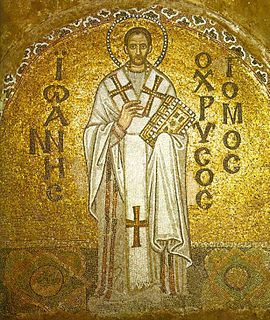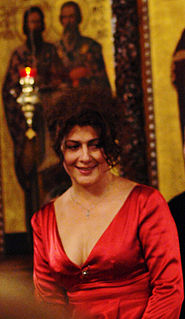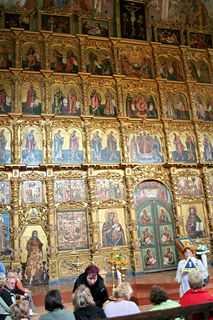
Saint John Chrysostom, Archbishop of Constantinople, was an important Early Church Father. He is known for his preaching and public speaking, his denunciation of abuse of authority by both ecclesiastical and political leaders, the Divine Liturgy of Saint John Chrysostom, and his ascetic sensibilities. The epithet Χρυσόστομος means "golden-mouthed" in Greek and denotes his celebrated eloquence. Chrysostom was among the most prolific authors in the early Christian Church, exceeded only by Augustine of Hippo in the quantity of his surviving writings.

Sergei Vasilyevich Rachmaninoff was a Russian composer, virtuoso pianist and conductor of the late Romantic period, some of whose works are among the most popular in the Romantic repertoire.

Alexander Koshetz was a Ukrainian choral conductor, arranger, composer, ethnographer, writer, musicologist, and lecturer. He helped popularize Ukrainian music around the world. His name is sometimes transliterated as Oleksandr Koshyts.

The Sanctus is a hymn in Christian liturgy. It may also be called the epinikios hymnos when referring to the Greek rendition.

The Liturgy of Saint James or Jacobite liturgy is the oldest complete form of the Eastern varieties of the Christian liturgy still in use among certain Christian Churches.
Pavel Grigorievich Chesnokov, also transliterated Tschesnokoff, Tchesnokov, Tchesnokoff, and Chesnokoff, was an Imperial Russian and Soviet composer, choral conductor and teacher. He composed over five hundred choral works, over four hundred of which are sacred. Today, he is most known for his piece Salvation is Created as well as works such as Do Not Reject Me in Old Age and movements from various settings of the Divine Liturgy of St John Chrysostom.

Josif Marinković was a Serbian compoaer and choral director. Like his younger contemporary Stevan St. Mokranjac, he was devoted to mainly vocal genres—lied and choral. Marinković was a romanticist with a pronounced affinity for melodic expression. He invested exceptional attention to the text declamation, which represented a rather novel quality in Serbian music at the time.
The Liturgy of Saint Basil or, more formally, the Divine Liturgy of Saint Basil the Great, is a term for several Eastern Christian celebrations of the Divine Liturgy (Eucharist), or at least several anaphoras, which are named after Basil of Caesarea. Two of these liturgies are in common use today: the one used in the Byzantine Rite ten times a year, and the one ordinarily used by the Coptic Church.
The Dismissal is the final blessing said by a Christian priest or minister at the end of a religious service. In liturgical churches the dismissal will often take the form of ritualized words and gestures, such as raising the minister's hands over the congregation, or blessing with the sign of the cross. The use of a final blessing at the end of a liturgical service may be based upon the Priestly Blessing prescribed for the kohanim in the Torah.
The Liturgy of St. John Chrysostom is the musical setting of the Divine Liturgy of St. John Chrysostom by Mykola Leontovych. Consistent with Orthodox tradition, in which service is sung exclusively a cappella, the piece is set for unaccompanied choir and soloist. It was first performed in the Mykolaiv Cathedral at the Kiev Pechersk Lavra on May 22, 1919, with Leontovych himself conducting.
The All-Night Vigil for choir is an a cappella choral composition by Pyotr Ilyich Tchaikovsky, his Op. 52, written from 1881 to 1882. It consists of settings of texts taken from the Russian Orthodox all-night vigil ceremony.
A musical setting is a musical composition that is written on the basis of a literary work. The literary work is said to be set, or adapted, to music. Musical settings include choral music and other vocal music. A musical setting is made to particular words, such as poems. By contrast, a musical arrangement is a musical reconceptualization of a previously composed work, rather than a brand new piece of music. An arrangement often refers to a change in medium or style and can be instrumental, not necessarily vocal music.

Divna Ljubojević, sometimes called by just her first name, i.e. Divna, is a Serbian singer and conductor of Orthodox Christian sacred music of various languages; she is a founder, the conductor and artistic director of the Melodi ensemble, a "choir and studio for spiritual music". Lykourgos Angelopoulos, professor at the School of Byzantine Chant at the Conservatory of Athens, founder and director of the Greek Byzantine Choir and Archon Protopsaltes of the Patriarchate of Constantinople, has described her as having one of the purest voices he has ever heard.
In music, Op. 31 stands for Opus number 31. Some compositions assigned this number:
In music, Op. 41 stands for Opus number 41. Some compositions assigned this number:
This page is based on this
Wikipedia article Text is available under the
CC BY-SA 4.0 license; additional terms may apply.
Images, videos and audio are available under their respective licenses.






